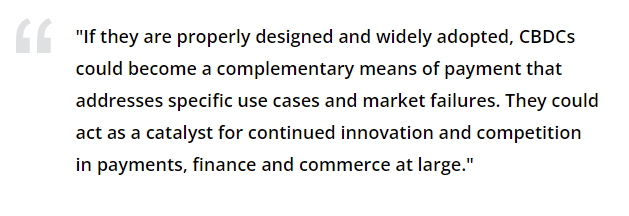Central banks representing a fifth of world’s population likely to issue CBDC in 3 years: BIS
Many nations are moving to advanced stages of CBDC engagement, according to the Bank for International Settlements.
Central bank digital currencies, or CBDCs, are entering the “advanced stages” of engagement as nations around the world look to capitalize on blockchain technology, according to a new report by the Bank for International Settlements.
In its latest survey of CBDC development, the BIS shows that central banks representing roughly a fifth of the world’s population are set to introduce a “general purpose CBDC in the next three years.”
The 23-page document is based on primary consultations with more than 60 monetary authorities conducted in late 2020.
The survey indicates that 86% of global central banks are actively exploring CBDCs. While the majority remain unlikely to issue a digital currency in the foreseeable future, a sizable minority are moving ahead.
Roughly 60% of central banks are experimenting with digital currencies, while 14% are moving forward with development and pilot programs.
“Around the globe, interest in CBDCs continues to be shaped by local circumstances,” said authors Codruta Boar and Andreas Wherli. “In emerging market and developing economies, where central banks report relatively stronger motivations, financial inclusion and payments efficiency objectives drive general purpose CBDC work.”
The United States Federal Reserve is one of the monetary authorities actively researching CBDCs. Fed economists are exploring the so-called “intrinsic value” of the digital dollar and have issued several research papers on the subject.
The BIS authors conclude:
In prepared remarks released alongside the report, BIS general manager Agustin Carstens said CBDCs can "serve as the basis for well functioning payments," but only when accompanied with "good law enforcement." Anonymous tokens "will not fly," he said.
Carsten explained that CBDCs without attached identity would elevate money laundering concerns, undermine efforts to boost financial inclusion and contribute to cross-border instability.
He continued:
Commonly referred to as the “bank for central banks,” the BIS promotes monetary and financial stability and international cooperation among global central banks. Founded in 1930 and headquartered in Basel, Switzerland, the organization’s mandate has expanded over the decades to include emergency funding for troubled governments.
As Cointelegraph reported last week, the BIS is currently working on a CBDC settlement platform. Early-stage trials are set to begin later this year.

